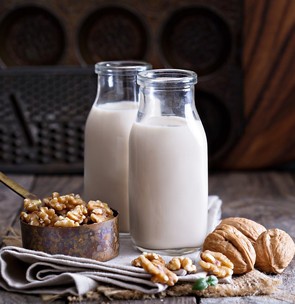

Published on Aug 05th, 2021

Dairy milk is extracted from mammals, such as goats, cows, sheep, and camels. It is considered as a diet full of nutrients and vital supplements that include vitamins, essential amino acids, and trace minerals. But gone are the days when people would rely on dairy milk, due to several types of research and dietary revolutions people are now more aware of what they eat and how it affects their lifestyle. If the former is discarded then later must have been adapted, and that is alternative milk. Due to intolerance of lactose and dairy allergy people opt for other options.
The following types of alternatives to milk.
With no saturation of fat and 30% of calories, almond milk is quite popular among people. It is also used in shakes, desserts, and smoothies.
A great cup of nutrients you can get while you have soy milk as it contains 7 grams of proteins and 2 cups of fiber along with potassium. Soy yogurt, cheese, pancakes, bread, and mayonnaise can be made.
Another good option is to replace dairy milk in the meal that you cook with 1% of protein though rich in Vitamins C and E.
Lactose intolerant people can enjoy their dairy feast while having a cup of cashew milk which is full of Vitamin A, D, E, and calcium along with Iron. Usually consumed in making puddings, porridge, and smoothies.
Very low in sodium with no fats or cholesterol makes a perfect choice for people with diabetes, bowel syndrome, and celiac disease. It is a rich source of calcium.
As the name says, Rice milk is made up of rice. A cup with no proteins and high in calories, 70 calories per cup!
Having said that, the nutrients that dairy-free milk has and those important nutrients that it lacks make it easy to compare both dietary products with or without dairy that could be helpful to choose what to eat and what not for a healthier lifestyle that impacts the survival and life span as well.

(a) People with intolerance of lactose, allergies, and other sensitivities can enjoy the alternative products.
(b) Vegans and nuts-loving people can easily serve their taste buds.
(c) Different flavours are offered alongside sweetened and unsweetened milk.
(d) Usually milk extracted from mammals causes acne and other skin problems, but regular milk doesn't.
(e) It doesn't trigger skin conditions eczema or rosacea that dairy milk usually does to people with allergies.
(f) For People who are keenly interested in maintaining their weight with appropriate proportions of nutrition then dairy-free milk is the right choice for them.
(g) Deserts, bread, cookies, smoothies, shakes, curry, and whatnot can be made from dairy milk’s substitution.
(h) The main compounds of dairy milk are safety, its nutrivity, and the quality of taste.

(a) The ratio of Omega6 acids to Omega3 acids present in organic milk is lower than the ratio present in regular milk, which could lead to heart disease.
(b) Highly saturated in fats.
(c) Intolerant for people who are soy sensitive.
(d) Contains lots of added sugar as a sweetener, which could also be harmful.
(e) Generates profit for farmers rather than aiding capitalism like the milk which is not obtained by the means of diary.
(f) As it's processed milk so not so rich in iron, calcium, magnesium, and plenty of vitamins.
(g) Dairy-free milk doesn't guarantee good health conditions.
Natural products are full of what your body needs for energy to operate by providing fuel to your brain, heart, bones, and muscles. Similarly, organic milk contains a sufficient amount of minerals, proteins, and vitamins. Milk from cow has Iron, Vitamin E, K, B-6, Selenium, 28% Calcium, 7% Magnesium, 10% Potassium, 24% Phosphorous, 12.5% Vitamin A, 16% Vitamin B-12, 11% Zinc, 16% Protein and 3% Folfafe. It helps in bone development, heart health, and is a good source of appetite control. This precisely tells what could be the cons of dairy-free milk.
After evaluating pros and cons of regular and organic milk by summarizing the amount of vital minerals and other elements that play an important role for the nourishment of organs, it could be easy to analyse which one works best for what. Satisfying taste buds with energy must be kept in mind before choosing any.
BackBe the first to know about new products, events and offers.